|
READS
by Dolman
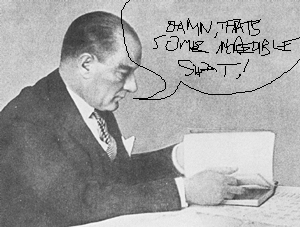
PART
2: BOOKS
POETRY,
OKAY?
Of course the great masses will always be wary of, if not
outright dissing on, poetry. And indeed, most folks claiming
the title of "poet" are highly suspect. But the
truth remains that the poet is one of the deepest artists
of our time, and he doesn't require any electricity or other
corporate energy whatsoever to practice and perform his craft.
So you tough guys with your amplifiers, laptops, circuitry,
and power strips might want to heed the words of no less a
tough guy than Emmett Grogan, from his book Ringolevio,
writing (about himself in the third person) of his first time
in prison: "He became friendly with a lot of guys on
the tier, and they lent him books, and taught him a lot of
things he had never known, but always wanted to learn. The
books were generally anthologies of poetry, which are highly
prized by long-termers because you can read them over and
over without getting bored; the abstract phrasing of the words
stimulates your imagination, and gives your mind opportunity
to think for itself." I think that says it all, and with
that I bring you reviews of a veritable barrage of poetry
books......
FEBRUARY 03 by Todd Colby, Alex Gildzen, Thurston
Moore, Matthew Wascovich (SLOW
TOE PUBLICATIONS)
 One
small-press chapbook-type imprint that I've been watching
lately is Slow Toe out of Cleveland, Ohio. I like them because
they're part aesthetes, part rockers, with the latter side
winning. This book, February 03, is a great place
to grab at the Slow Toe aesthetic, mixing the work of rocker/writer
Thurston Moore, writer/rocker/Slow Toe proprieter Matthew
Wascovich, old-school Cleveland lifer Alex Gildzen, and relatively
'traditional' poet Todd Colby. Plus, the premise of the book
is some on-the-fly jamming: each participant wrote a poem
a day throughout the month of February 2003, expressly for
inclusion in this book, which publishes all 112 poems (28
days x 4). Some of these are the briefest of toss-offs while
others are intense swaths of real beauty and meaning, but
even at its most casual and nonsenscial (I'm looking at you
Mr. Moore, although Colby also turns in several ultra-brief
whatsises), the book moves and rocks and makes things happen. One
small-press chapbook-type imprint that I've been watching
lately is Slow Toe out of Cleveland, Ohio. I like them because
they're part aesthetes, part rockers, with the latter side
winning. This book, February 03, is a great place
to grab at the Slow Toe aesthetic, mixing the work of rocker/writer
Thurston Moore, writer/rocker/Slow Toe proprieter Matthew
Wascovich, old-school Cleveland lifer Alex Gildzen, and relatively
'traditional' poet Todd Colby. Plus, the premise of the book
is some on-the-fly jamming: each participant wrote a poem
a day throughout the month of February 2003, expressly for
inclusion in this book, which publishes all 112 poems (28
days x 4). Some of these are the briefest of toss-offs while
others are intense swaths of real beauty and meaning, but
even at its most casual and nonsenscial (I'm looking at you
Mr. Moore, although Colby also turns in several ultra-brief
whatsises), the book moves and rocks and makes things happen.
I think the MVP (most
valuable poet!) of the book is Alex Gildzen. I'd never heard
of him before, but he was first published in 1969 and lends
some middle-aged streetwise serenity to the affair, with nice
rhythmic post-William Carlos Williams imagery, heavily autobiographical,
with an age and grace that reminds me of Ira Cohen, actually,
but Gildzen's verse is more abbreviated, in that WCW "Red
Wheelbarrow" kind of way. Let's see, I'll find a couple
. . . okay, p. 32, from 6 Feb 03, "dice on her
bosom/cherries in her hair/Nina Mae McKinney/a bowl of sass,"
or the entirety of 17 Feb 03, "without sun/the
watermelon mountains/look rancid/a pile of rinds," or
another one, "Melina begins our day/by walking back &
forth/across my body" which I thought was real sexy,
but actually just now rereading the poem I realize Melina
is his cat. (I guess it would be kind of implausible if his
girlfriend stood up and walked on him every morning. Sexy,
though.)
As for the other
guys, all are distinctive and vital to the whole. Wascovich
is real solid, building punk abstractions out of short lines
that are like quick and lean boxing jabs, "your stance
/ a clumsy study / tonal tunnels / dig into brain hole / into
the sex progress / a quiet avenue / lost love term,"
or "real estate / legal pad / stop sign / soldier boot
fry / by the veteran's administration," or "kick
box fukkin dna / along the cracked streets / of upper haight
/ water drains into recessed lights / the hotel is quiet /
in the lobby / foreigners thank each other / route 80 does
not sleep / under weather advisory." Meanwhile, Todd
Colby and Thurston Moore sort of duke it out for the title
of court jester and/or class clown, although with completely
different approaches -- Colby comes off like the quiet and
clean-cut guy with the dry humor who takes his jokes seriously
(two of his poems in their entirety: "(A Dingy Plum In
The Sullen Cashier's Hand)/I want you to watch yourself take
off my clothes" and "(A Cup Of Cocoa With 2 Sad
People)/It didn't happen."), while Moore is the shaggy
rockin' wildman who treats his serious bits as jokes ("the
stooges calendar offsets the vintage wood as does the fur
teacup lp cover framed in queero album frame as does the warhol
spoo and the daniel moore omnibus of warrior quotes. shitting
here is a virtual picnic."). As with all good poetry,
there's a lot to read in between the lines and a lot to think
about in the blank spaces. America's turn towards overt (instead
of covert) war-fueled totalitarian capitalism is of course
a constant presence, as February 2003 was real close to a
certain unilateral invasion of a certain not especially threatening
Middle Eastern country, but really, most of the goods here
are much smaller and close to home than that, so get a copy
and see how they shake out according to your own perspective
. . . .
APARTMENT
36E by Matthew Wascovich (SLOW
TOE PUBLICATIONS)
 These
next two Slow Toe missives are presented in classic 8.5x11
mimeo style, top-stapled (see the three staples in the cover
image to the left?), as opposed to the perfect-bound February
03. Hard to get past the cover on this one (drawing by
Dylan Nyoukis -- yes, that is a penis AND a hook for a hand),
but on the inside is a five-poem solo joint by Wascovich.
Takes about 60 seconds to read, so you've got plenty of time
to go back and read it several more times to see what you
missed. Cuz isn't that what poetry is all about? The changing
same? The noticing upon second or even fifth read that, in
the line "and i'll peak thru the bookshelves at you like
a god damn dork," the spelling of the word "peek"
as "peak" is probably intentional, because what
a writer does is indeed "peak thru bookshelves,"
rising above the huge glut of words-on-paper out there in
order to communicate directly with YOU? And then there's other
insights you might not think about until the second time,
like "i'll tell you what's great is the paris poems of
cesar vallejo / there's so much to keep us occupied / if it
isn't survival it's notes from an amplifier" . . . . These
next two Slow Toe missives are presented in classic 8.5x11
mimeo style, top-stapled (see the three staples in the cover
image to the left?), as opposed to the perfect-bound February
03. Hard to get past the cover on this one (drawing by
Dylan Nyoukis -- yes, that is a penis AND a hook for a hand),
but on the inside is a five-poem solo joint by Wascovich.
Takes about 60 seconds to read, so you've got plenty of time
to go back and read it several more times to see what you
missed. Cuz isn't that what poetry is all about? The changing
same? The noticing upon second or even fifth read that, in
the line "and i'll peak thru the bookshelves at you like
a god damn dork," the spelling of the word "peek"
as "peak" is probably intentional, because what
a writer does is indeed "peak thru bookshelves,"
rising above the huge glut of words-on-paper out there in
order to communicate directly with YOU? And then there's other
insights you might not think about until the second time,
like "i'll tell you what's great is the paris poems of
cesar vallejo / there's so much to keep us occupied / if it
isn't survival it's notes from an amplifier" . . . .
SLIT
PINK EYE ENGULF SHADOW by Elisa Ambrogio & Matthew Wascovich
(SLOW TOW PUBLICATIONS)
 As
previously suggested, Slow Toe writers are often better known
as musicians. For example, Thurston Moore. For another example,
Elisa Ambrogio is the pepperpot singer/guitarist for the upstart
splatter trance trio Magik Markers, who've been travelling
the globe playing festivals and touring with a lot of big
names. But don't think she doesn't deserve to be a "writer"
or anything, because she's a pretty powerful poet in ways
that have very little to do with rock'n'roll mobility. Her
first piece in here is called "Thomas Cranmer,"
and I hope that's not his real name because this is a pretty
tough love-gone-sour poem. Funny, too, though probably not
for Mr. Cranmer: "What'll we do with ourselves this afternoon?
/ And the day after that? / I'm not going to play canasta
with you / I'm not going to like Carla Bozulich with you /
Red Headed Stranger was just fine without her / And
the day after that? / I'm not going to / smoke weed from a
crushed wild cherry pepsi can with you / work fuck and own
a dog with you / You will do your laundry / sweep your floors
/ and make a tape loop. / And the day after that? / A stranger
in a bedroom for four years / I am so slow at everything."
Yee-owch. There's also a heavy sex poem, and a great little
recount of a passing television epiphany starring Marianne
Faithful. Five poems in all, by each writer, for a total of
ten. Next to Ambrogio, Wascovich's punchy style is more allusive
and abstract -- there seems to be some sexual allusion going
on, but the theme I'm mostly getting, in a rather subtle way,
is one about nationalism and politics, via lines like "modern
men don't follow key heroes / standing behind fence in a fear
trance / senseless / morning tube rush / anticipated unanticipated
situations / cheap academy take me home" and little flashes
like "america / hideous protection / precarious delicate."
As
previously suggested, Slow Toe writers are often better known
as musicians. For example, Thurston Moore. For another example,
Elisa Ambrogio is the pepperpot singer/guitarist for the upstart
splatter trance trio Magik Markers, who've been travelling
the globe playing festivals and touring with a lot of big
names. But don't think she doesn't deserve to be a "writer"
or anything, because she's a pretty powerful poet in ways
that have very little to do with rock'n'roll mobility. Her
first piece in here is called "Thomas Cranmer,"
and I hope that's not his real name because this is a pretty
tough love-gone-sour poem. Funny, too, though probably not
for Mr. Cranmer: "What'll we do with ourselves this afternoon?
/ And the day after that? / I'm not going to play canasta
with you / I'm not going to like Carla Bozulich with you /
Red Headed Stranger was just fine without her / And
the day after that? / I'm not going to / smoke weed from a
crushed wild cherry pepsi can with you / work fuck and own
a dog with you / You will do your laundry / sweep your floors
/ and make a tape loop. / And the day after that? / A stranger
in a bedroom for four years / I am so slow at everything."
Yee-owch. There's also a heavy sex poem, and a great little
recount of a passing television epiphany starring Marianne
Faithful. Five poems in all, by each writer, for a total of
ten. Next to Ambrogio, Wascovich's punchy style is more allusive
and abstract -- there seems to be some sexual allusion going
on, but the theme I'm mostly getting, in a rather subtle way,
is one about nationalism and politics, via lines like "modern
men don't follow key heroes / standing behind fence in a fear
trance / senseless / morning tube rush / anticipated unanticipated
situations / cheap academy take me home" and little flashes
like "america / hideous protection / precarious delicate."
WHY
THE FUCK ARE YOU HERE? (for the Magik Markers), by Byron Coley
- Thurston Moore - Matthew Wascovich (SLOW
TOE PUBLICATIONS)
 And
speaking of the Magik Markers, here's a little book written
just for them. This is actually intended as an insert into
the Magik Markers album I Trust My Guitar etc. --
1,300 copies were made, a thousand for the LP run, the remaining
300 released as stand-alone literature. I gotta say, it's
a tiny little thing (just one poem by each writer, a total
of, yep, three), and feels a lot more like an LP insert than
anything that could be called a "book." Then again,
this "book" is in fact part of a time-honored tradition
called a folio, which is "A large sheet of paper
folded once in the middle, making two leaves or four pages
of a book or manuscript." Hey, it could've been another
even shorter time-honored poetry vehicle known as a broadside,
which is just a single page printed on only one side, and
you woulda really been crying "ripoff," but shit,
maybe this is how poems are supposed to be presented, just
one to four at a time, because poems are like concentrated
words, and unlike concentrated orange juice, they actually
get less tasty if you water 'em down. Maybe poems aren't supposed
to be stacked in books to the ceiling, they're supposed to
be taken singly as laser-beams to your brain and heart. So
how are these three particular lasers? Coley's is a short-and-sweet
declaration of situation and intent ("but now the hurricane
/ will not be buckled / so throw up yr arms / and ride the
fucking currents"), Moore's is more of a quick impressionistic
zine-y show/band review than it is a poem, and not unrefreshing
as such ("elisa plucking low string on upside down guitar
surrounded by whistling feedback" . . . "really
really the real deal, -- cdrs w/ no info wrapped in cardboard
and duct taped --"), and Wascovich does his punchy thing,
here with a fractured summary of the Markers' attitude and
energy ("the bring it women plus man fury / an alley
outside door silver tinsel curling / real pussy says fuck
the east coast / touch us you freaks").
And
speaking of the Magik Markers, here's a little book written
just for them. This is actually intended as an insert into
the Magik Markers album I Trust My Guitar etc. --
1,300 copies were made, a thousand for the LP run, the remaining
300 released as stand-alone literature. I gotta say, it's
a tiny little thing (just one poem by each writer, a total
of, yep, three), and feels a lot more like an LP insert than
anything that could be called a "book." Then again,
this "book" is in fact part of a time-honored tradition
called a folio, which is "A large sheet of paper
folded once in the middle, making two leaves or four pages
of a book or manuscript." Hey, it could've been another
even shorter time-honored poetry vehicle known as a broadside,
which is just a single page printed on only one side, and
you woulda really been crying "ripoff," but shit,
maybe this is how poems are supposed to be presented, just
one to four at a time, because poems are like concentrated
words, and unlike concentrated orange juice, they actually
get less tasty if you water 'em down. Maybe poems aren't supposed
to be stacked in books to the ceiling, they're supposed to
be taken singly as laser-beams to your brain and heart. So
how are these three particular lasers? Coley's is a short-and-sweet
declaration of situation and intent ("but now the hurricane
/ will not be buckled / so throw up yr arms / and ride the
fucking currents"), Moore's is more of a quick impressionistic
zine-y show/band review than it is a poem, and not unrefreshing
as such ("elisa plucking low string on upside down guitar
surrounded by whistling feedback" . . . "really
really the real deal, -- cdrs w/ no info wrapped in cardboard
and duct taped --"), and Wascovich does his punchy thing,
here with a fractured summary of the Markers' attitude and
energy ("the bring it women plus man fury / an alley
outside door silver tinsel curling / real pussy says fuck
the east coast / touch us you freaks").
THE
BUDDHIST THIRD CLASS JUNK MAIL ORACLE, the Art and Poetry
of D.A. Levy, edited by Mike Golden (SEVEN
STORIES PRESS)
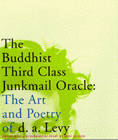 Slow
Toe is from Cleveland, which was also the home of D.A. Levy,
who is one of the greatest of all American poets. I do not
say this lightly, either -- I really believe it to be true.
Certainly in the "post-War" category, he's a true
god. You might've heard of this guy, like I first did, via
Thurston Moore, who mentioned him in a Sonic Youth song ("Small
Flowers Crack Concrete" from the year 2000's NYC
Ghosts & Flowers) and then mentioned him again in
his Arthur Magazine
Bull Tongue column. After that, I read and dug a very small
amount of Levy stuff (about 1/800th of this
super-heavy online site), but I didn't truly fall in love
until one day when I happened across a Levy excerpt in a great
anthology called The Outlaw Bible of American Poetry
(1999, Thunder's Mouth Press). This happened very soon after
the 2004 U.S. Presidential Appointment, and it so effectively
cleared my head of all the pop-political bullshit it had been
muddled in, I just have to share the whole excerpt with you: Slow
Toe is from Cleveland, which was also the home of D.A. Levy,
who is one of the greatest of all American poets. I do not
say this lightly, either -- I really believe it to be true.
Certainly in the "post-War" category, he's a true
god. You might've heard of this guy, like I first did, via
Thurston Moore, who mentioned him in a Sonic Youth song ("Small
Flowers Crack Concrete" from the year 2000's NYC
Ghosts & Flowers) and then mentioned him again in
his Arthur Magazine
Bull Tongue column. After that, I read and dug a very small
amount of Levy stuff (about 1/800th of this
super-heavy online site), but I didn't truly fall in love
until one day when I happened across a Levy excerpt in a great
anthology called The Outlaw Bible of American Poetry
(1999, Thunder's Mouth Press). This happened very soon after
the 2004 U.S. Presidential Appointment, and it so effectively
cleared my head of all the pop-political bullshit it had been
muddled in, I just have to share the whole excerpt with you:
From Tombstone as a Lonely Charm (Part
3)
by d.a. levy
if you want a revolution
return to your childhood
and kick out the bottom
don't mistake changing
headlines for changes
if you want freedom
don't mistake circles
for revolutions
think in terms of living
and know
you are dying
& wonder why
if you want a revolution
learn to grow in spirals
always being able to return
to your childhood
and kick out the bottom
This is what ive been
trying to say--if you
attack the structure--
the system--the establishment
you attack yourself
KNOW THIS!
& attack if you must
challenge yourself externally
but if you want a revolution
return to your childhood
& kick out the bottom
be able to change
yr own internal chemistry
walk down the street
& flash lights in yr head
at children
this is not a game
your childhood
is the foundation
of the system
walk down the street
flash lights in yr head
at children but be wary
of anyone old enough to kill
learn how to disappear
before they can find you
(that is, if you want to
stay alive)
if you want a revolution
do it "together"
but dont get trapped in
words or systems
people are people
no matter what politics
color or words they use
& they all have children
buried in their head
if you want a revolution
grow a new mind
& do it quietly
if you can
return to your childhood
and kick out the bottom
then become a being
not dependent on words
for seeing
whenever you get bored
change headlines
colors politics words
change women
but if you really want
a revolution
learn how to change
your internal chemistry
then go beyond that
walk down the streets
& flash light at
yourself
You can
get this lovely pearl of true contemporary wisdom and TONS
of other stuff in a fine collection called The Buddhist
Third Class Junk Mail Oracle, which was also the name
of a magazine Levy self-published (the last issue came out
in 1968). There is a LOT of poetry reprinted here -- "Introduction
to the Cement Fuck," all 28 pages of "The North
American Book of the Dead," excerpts from "Cleveland:
The Rectal Eye Visions," "BLIND MYTH doing a death
dance on GROUND ZERO," and definitely much more -- also
several of his original covers and pages from the magazine,
as well as a clutch of his wild collage art and concrete poems.
There's also a long investigation by editor Mike Golden into
his rather turbulent police-hounded life, and the mysterious
circumstances of his apparent suicide at age 26, and the whole
thing adds up to a very bittersweet song about the mostly
successful statist suppression of the 1960s American Revolution.
JACK
BREWER: No Lunch (SINISTRY PRESS)
 So
while Slow Toe and Levy were getting me back into a poetry
state of mind, I stopped by a blowout winter sale at Chicago's
landmark Quimby's bookstore,
where tons of old random zines, comix, and books were on offer
for little more than a dollar apiece. Five to ten years ago
I probably woulda spent at least $50 at this thing, flinging
a dollar or two at any comic with autobiography (however cheesy)
and/or nudity and/or Crumb, any zine with a tour diary (however
cheesy), any interview with a Siltbreeze recording artist
(hell, any record review of a Siltbreeze record might've
tipped the scales), but at this stage in my life I just looked
at everything and said, "That'd be cool -- but I don't
have room for it in my apartment anymore." Story of my
life. But I did find one little book for a buck that I immediately
decided to make room for, and you bet, it was more poetry.
A nice little book from 1991 by the one and only SST recording
artist Jack Brewer. You might know him as the vocalist for
Saccharine Trust for the last 25 years, but then again you
might not -- there just doesn't seem to be a whole lot of
Sacc Trust freaks out there. Regardless, this is a book by
a modern-day poet-struggler hipster-saint (look at that picture
on the cover, somewhere between Jesus the C and your local
big-city art gallery owner) that is both tough-as-nails and
sweet-as-an-angel, and this guy is honestly no small heir
to the legacy of guys like Levy. I read the whole book beginning
to end in one train-ride home from work, and he especially
nailed me early with "Elysian Fields": So
while Slow Toe and Levy were getting me back into a poetry
state of mind, I stopped by a blowout winter sale at Chicago's
landmark Quimby's bookstore,
where tons of old random zines, comix, and books were on offer
for little more than a dollar apiece. Five to ten years ago
I probably woulda spent at least $50 at this thing, flinging
a dollar or two at any comic with autobiography (however cheesy)
and/or nudity and/or Crumb, any zine with a tour diary (however
cheesy), any interview with a Siltbreeze recording artist
(hell, any record review of a Siltbreeze record might've
tipped the scales), but at this stage in my life I just looked
at everything and said, "That'd be cool -- but I don't
have room for it in my apartment anymore." Story of my
life. But I did find one little book for a buck that I immediately
decided to make room for, and you bet, it was more poetry.
A nice little book from 1991 by the one and only SST recording
artist Jack Brewer. You might know him as the vocalist for
Saccharine Trust for the last 25 years, but then again you
might not -- there just doesn't seem to be a whole lot of
Sacc Trust freaks out there. Regardless, this is a book by
a modern-day poet-struggler hipster-saint (look at that picture
on the cover, somewhere between Jesus the C and your local
big-city art gallery owner) that is both tough-as-nails and
sweet-as-an-angel, and this guy is honestly no small heir
to the legacy of guys like Levy. I read the whole book beginning
to end in one train-ride home from work, and he especially
nailed me early with "Elysian Fields":
There
are troops on the pavement,
meetings in the basement,
secession in our hearts,
terrorists in the school yards.
They're fasting in the prisons,
messiah has risen,
the curfew is set at six,
the dogs are working double shifts,
but the last time I saw you
you were lying on Elysian fields.
All I could comprehend
Is that I failed you again.
Holy shit,
it kills me when he hits the "you were lying on Elysian
fields" line. But he keeps going and turns it into a
heavy sex poem:
Nothing is beyond
me
When you are under me --
you are below me;
heartfully, soulfully.
Oh what I would do to possess
the love you so freely give
and stick something sensible inside you.
But the last time I saw you, you were lying on Elysian fields
as you gave a solemn stare
into the heavens.
Damn.
He also seems to understand the imperialism on which modern
American society has always depended, and, unlike most 'radicals',
he includes himself as one of the dependents: "all the
slaughters of the world that lie beneath my fingers to comfort
my aching existence so that I can spit ink." And speaking
of imperialism, check this on page 25, a poem that opens "I
lay on the floor: my head laxed in memory./I realize Bush
doesn't understand me." The title of the poem is "Election
'88," and that's the original George Bush being name-checked,
and here it is 15 years later and these Bush fucks are still
in power and they still don't understand shit. So yeah, the
book is almost 15 years old, but relevant, spiritual, heavy,
under the radar, and etcetera -- nice one.
GOD
SAVE MY QUEEN II by Daniel Nester (SOFT
SKULL PRESS)
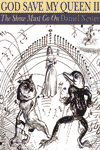 More
poetry: Daniel Nester's 2005 sequel to his 2003 book God
Save My Queen. Perhaps you recall the concept of the
original, a poem for each song on each Queen album, in order,
from their s/t debut (1973) through Hot Space (1982).
I really wanted to like the book because, like Nester, I was
a huge Queen fan in my youth (and in fact Hot Space
was the last Queen album I ever bought, the week it came out,
at age 12). It certainly had some good writing, but the one-for-each-song
concept never worked for me. It seemed too arbitrary, and
a little awkward. Awkwardness is also the word of the day
for the sequel, but this time it's the awkwardness of Queen's
1980s career -- picking up right where the first one left
off, II provides poems for lesser albums The
Works (1984) through the posthumous Made in Heaven
(1995). The band was struggling, and this career awkwardness
frees Nester to really embrace his own awkwardness, both stylistically
and autobiographically, and his Queen project seems to find
its legs as one part disjointed liner note/band history, one
part awkward memoir. For example, there's a hilarious bit
where the young Nester collects a set of four Queen interview
picture discs, one for each member, insisting that each one
contains a separate interview with the person pictured, only
to find, while his friends gather around guffawing, that all
four contain the exact same full-band interview. Nester also
chronicles the withering away of Mr. Mercury in straightforward,
heartfelt, and well-researched terms. Stuff like: "There
seems to be a debate in the literature over Freddie's last
words. Jim Hutton says he said "Pee, pee," his signal
to get help to the bathroom. Minutes later, he had tightened
into a coma. He was gone. Other accounts have him saying "Cooee,"
which is what he said to call his many cats." More
poetry: Daniel Nester's 2005 sequel to his 2003 book God
Save My Queen. Perhaps you recall the concept of the
original, a poem for each song on each Queen album, in order,
from their s/t debut (1973) through Hot Space (1982).
I really wanted to like the book because, like Nester, I was
a huge Queen fan in my youth (and in fact Hot Space
was the last Queen album I ever bought, the week it came out,
at age 12). It certainly had some good writing, but the one-for-each-song
concept never worked for me. It seemed too arbitrary, and
a little awkward. Awkwardness is also the word of the day
for the sequel, but this time it's the awkwardness of Queen's
1980s career -- picking up right where the first one left
off, II provides poems for lesser albums The
Works (1984) through the posthumous Made in Heaven
(1995). The band was struggling, and this career awkwardness
frees Nester to really embrace his own awkwardness, both stylistically
and autobiographically, and his Queen project seems to find
its legs as one part disjointed liner note/band history, one
part awkward memoir. For example, there's a hilarious bit
where the young Nester collects a set of four Queen interview
picture discs, one for each member, insisting that each one
contains a separate interview with the person pictured, only
to find, while his friends gather around guffawing, that all
four contain the exact same full-band interview. Nester also
chronicles the withering away of Mr. Mercury in straightforward,
heartfelt, and well-researched terms. Stuff like: "There
seems to be a debate in the literature over Freddie's last
words. Jim Hutton says he said "Pee, pee," his signal
to get help to the bathroom. Minutes later, he had tightened
into a coma. He was gone. Other accounts have him saying "Cooee,"
which is what he said to call his many cats."
AHISTORICAL
PRODUCTIONS by Max Sympathy (AHISTORICAL PRODUCTION)
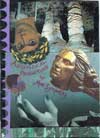 This
one is weird in so many ways, almost all good. First of all,
the return address said "Prescott, AZ via Amsterdam."
Kinda weird. Then, the enclosed postcard said "Hey
Blastitude!! C. Ptak wrote me a nice note after finding a
little book of mine and this led me to you! This book is available
at the cool bookstores of the Netherlands or from me: maxsympathy
at yahoo dot com. Max has been kicking around for years and
will probably run into you soon! He has performed with, roadied
for, or bothered every cool American fuck since Jello met
Biafra! Survive! Max Sympathy!!!" Whoah, C. Ptak,
the Netherlands, "every cool American fuck"? Who
is this guy? "Finding a little book of mine"? What
was it, under a rock? Also weird is the book itself, which
is three small hand-sewn chapbooks that are hand-bound inside
a cover that is made from an old LP jacket (the spine of my
book reads Diamond Life by Sade). The end result
looks, reads, and holds very nicely! It opens with an epigram,
"Respect Your Elders....Same Way You Respect Handguns
& Traffikkk," and the whole thing has that one-unwashed-man-against-the-empire
feel to it -- equal parts straight poetry, anti-imperialist
invective, arcane philosophy, crazy talk, and HC lyrics, like
"Goth Child" ("Goth Child! Your mama's in rehab
/ Goth Child! You smell like a meth lab / Goth Child! You're
mangy and dirty / Goth Child! You're still under 30")
or "Joyous Dirge of the Downwardly Mobile" ("measuring
salt measuring sugar / got no beef got no larder / buying
cigarettes with food stamps / sell
yourself under street lamps") or the prose piece "Modern
Physical Forces From People At Bay." ("Television
commercials are the highest art conceivable? Are we still
feigning use of our minds? Do we pretense towards realizing
something or are we eking out an automated existence? Is there
anyone who can honestly proclaim that they are not an insect?
Yes? Please, explain this to the rest of the insects.")
And much, much more (even though it's a short book). I'm not
totally sure where Max Sympathy is coming from, but that's
a good thing, and wherever it may actually be, it's definitely
an interesting place. "Subscriptions, dough-nations,
salutations: maxsympathy at yahoo dot com." This
one is weird in so many ways, almost all good. First of all,
the return address said "Prescott, AZ via Amsterdam."
Kinda weird. Then, the enclosed postcard said "Hey
Blastitude!! C. Ptak wrote me a nice note after finding a
little book of mine and this led me to you! This book is available
at the cool bookstores of the Netherlands or from me: maxsympathy
at yahoo dot com. Max has been kicking around for years and
will probably run into you soon! He has performed with, roadied
for, or bothered every cool American fuck since Jello met
Biafra! Survive! Max Sympathy!!!" Whoah, C. Ptak,
the Netherlands, "every cool American fuck"? Who
is this guy? "Finding a little book of mine"? What
was it, under a rock? Also weird is the book itself, which
is three small hand-sewn chapbooks that are hand-bound inside
a cover that is made from an old LP jacket (the spine of my
book reads Diamond Life by Sade). The end result
looks, reads, and holds very nicely! It opens with an epigram,
"Respect Your Elders....Same Way You Respect Handguns
& Traffikkk," and the whole thing has that one-unwashed-man-against-the-empire
feel to it -- equal parts straight poetry, anti-imperialist
invective, arcane philosophy, crazy talk, and HC lyrics, like
"Goth Child" ("Goth Child! Your mama's in rehab
/ Goth Child! You smell like a meth lab / Goth Child! You're
mangy and dirty / Goth Child! You're still under 30")
or "Joyous Dirge of the Downwardly Mobile" ("measuring
salt measuring sugar / got no beef got no larder / buying
cigarettes with food stamps / sell
yourself under street lamps") or the prose piece "Modern
Physical Forces From People At Bay." ("Television
commercials are the highest art conceivable? Are we still
feigning use of our minds? Do we pretense towards realizing
something or are we eking out an automated existence? Is there
anyone who can honestly proclaim that they are not an insect?
Yes? Please, explain this to the rest of the insects.")
And much, much more (even though it's a short book). I'm not
totally sure where Max Sympathy is coming from, but that's
a good thing, and wherever it may actually be, it's definitely
an interesting place. "Subscriptions, dough-nations,
salutations: maxsympathy at yahoo dot com."
THE
MAYBOOK by Catherine Theis (YOUR
BEESWAX)
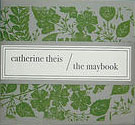 I
got handed this little baby by one of the proprieters of Your
Beeswax, a relatively new chapbook imprint sort of based in
Chicago and/or Oakland and definitely based at yourbeeswax.blogspot.com.
They got it to me just in time for spring, and it really made
my season. First of all, really sweet creative packaging --
a screen-printed fold-out pouch that contains nine poems,
each on their own little loose piece of paper, the author
name and book title appearing only on a wrap-around paper
seal that holds the whole thing together. The poems are short
little rumination-flashes on, as the title suggests, the nature
of spring, and they're just lovely. Check this: "the
lilac trees/stars I see/your scar shot/with lightning/maymoon/the
wind stirs/the waves, and in turn/your profile blooms/night
sky/petals/cupped hands/who in the world?/patient with the
intelligences". I'm just a sucker for that kind of quick
sweet imagistic stuff. These nine small flashes take about
20 seconds to read and at least a whole sweet season like
spring to mull. I
got handed this little baby by one of the proprieters of Your
Beeswax, a relatively new chapbook imprint sort of based in
Chicago and/or Oakland and definitely based at yourbeeswax.blogspot.com.
They got it to me just in time for spring, and it really made
my season. First of all, really sweet creative packaging --
a screen-printed fold-out pouch that contains nine poems,
each on their own little loose piece of paper, the author
name and book title appearing only on a wrap-around paper
seal that holds the whole thing together. The poems are short
little rumination-flashes on, as the title suggests, the nature
of spring, and they're just lovely. Check this: "the
lilac trees/stars I see/your scar shot/with lightning/maymoon/the
wind stirs/the waves, and in turn/your profile blooms/night
sky/petals/cupped hands/who in the world?/patient with the
intelligences". I'm just a sucker for that kind of quick
sweet imagistic stuff. These nine small flashes take about
20 seconds to read and at least a whole sweet season like
spring to mull.
And now
for some books that aren't poetry:
LIFE
& LIMB: Skateboarders Write From The Deep End, edited
by Justin Hocking, Jeff Knutson & Jared Jacang Maher;
MAMAPHONIC: Balancing Motherhood
and Other Creative Acts, edited by Bee Lavender and Maia Rossini
(both SOFT SKULL PRESS)
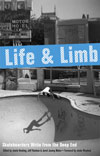 Back
on the zine-review page I was
saying how zines offer a unique literary experience that is
somewhere between essay/memoir, comix, newspaper/ magazine
news-profile-feature-opinion, etc. Here are two anthologies
from Soft Skull Press that are assuredly hit-and-miss but
still generally engaging in just that unique zine fashion.
Personal essays, memoirs, op pieces, mini-rants, poems, drawings,
photo essays, 2-6 pages by each contributor. You can dip in
anywhere in either book and read a page or two, an entire
essay or two (almost all are short and fast reads), and then
flip a random 48 or 102 pages to another couple pieces and
see what's on those folks' minds. Great bathroom reading (and
that is high praise in my house anyway) -- not every piece
you start will compel you to finish, but almost all of them,
even the outright cheese, carry at least some entertainment
and enlightenment value -- and sometimes even edutainment
value! Back
on the zine-review page I was
saying how zines offer a unique literary experience that is
somewhere between essay/memoir, comix, newspaper/ magazine
news-profile-feature-opinion, etc. Here are two anthologies
from Soft Skull Press that are assuredly hit-and-miss but
still generally engaging in just that unique zine fashion.
Personal essays, memoirs, op pieces, mini-rants, poems, drawings,
photo essays, 2-6 pages by each contributor. You can dip in
anywhere in either book and read a page or two, an entire
essay or two (almost all are short and fast reads), and then
flip a random 48 or 102 pages to another couple pieces and
see what's on those folks' minds. Great bathroom reading (and
that is high praise in my house anyway) -- not every piece
you start will compel you to finish, but almost all of them,
even the outright cheese, carry at least some entertainment
and enlightenment value -- and sometimes even edutainment
value!
Life
& Limb: Skateboarders Write from the Deep End
is by skateboarders and about skateboarding. The sport of
skateboarding is one of those things where an entire culture,
feeling, aesthetic, and lifestyle coalesces around an activity
that isn't necessarily a part that everyone participates in:
the nuts and bolts of riding around on a board. I myself have
only skateboarded once in my life, for about 10 minutes. That
was 15 years ago, and I didn't show much promise, but to this
day I still dress like a skater and I really like the music
they listen to. You could say I'm a poser, and I couldn't
deny it, but you could also say that I paid attention to what
certain people were doing in order to find a style for myself
that is both sharp and low-maintenance, functional and defiant.
My point sort of being that a lot of the nuts and bolts stuff
about skateboarding kind of goes over my head, but skateboarding
is a street sport and therefore the athletes aren't secluded
in some stadium, they're just out there in the world, so there's
that chance of everything in the world sneaking into these
stories, such as "exploratory punk rock cassette purchases
. . . . (for example: The Fartz)"; "She was wearing
an old Pink Floyd concert t-shirt (perhaps a hand-me-down
from her dad), and some blue shorty-shorts."; Toyota
Corollas and SUVs in Placerita Canyon; "typing on my
G3"; Led Zeppelin's In Through The Out Door
and its multiple covers; and much more. (For another example
of this, see the excellent Tent City DVD, in which
a crew of tent-camping road-trippers sees the suburban, urban,
and rural wilds of Australia through the prism of skating
anywhere they can.) And of course, if you don't like an essay,
you can always jump to the next, because it's a casual book
in that casual skateboarder way.
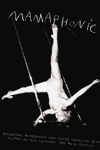 Not
so casual is the book Mamaphonic: Balancing Motherhood
and Other Creative Acts, because its essays
are entirely by moms with young kids, and moms with young
kids are usually not the most casual people in the room. But
they are often the most fun person in the room, along with
their kid, and the book captures a lot of that too. The essayists
here are all mothers of young children who are also working
artists, so you get a lot of that 'I live in a big city and
work from home as a technical writer while writing poetry
and essays in my (increasingly rare!) free time and I'm a
strict vegan (but my kids aren't vegan they can make that
decision on their own as they get older)' kind of thing. I'm
all for the lifestyle, I really am, but I also believe in
the old Buddhist adage "Show, don't tell," and how
can you not cross that line when you're writing from this
perspective? I wanted to like this book because I'm the father
of a 2 year old and I figured I'd be able to relate and my
wife would like it too -- we also usually eat vegan! But when
we get together with our friends who are also new parents,
all anyone seems to talk about is how smart our urbane semi-revolutionary
consumerist parenting decisions are; how proud we are to be
buying wooden toys instead of petroleum toys, to be eating
vegan (even if the food often comes in the same old petroleum-derived
packaging) and buying organic (even though we drive to the
organic grocery store and half the organic produce was trucked
in at great ecological expense from New Zealand or something
or other). It's not that I don't want to talk about these
things at all, I just don't want to preach about these things
when we're all so obviously converted -- this bizarre anti-nature
culture we live in has us so against the wall we even proselytize
to each other. Unfortunately, reading this book seems like
more of the same. Which isn't to say that there's not a lot
of information, survival tips, and support to be found here,
because there is. It's kinda all over the place, and it covers
a lot of different types of people, and the good stuff is
there if you want it and not there if you don't want it, and
you can read a little bit of any page and get the feel. You
never know what you might find; I just picked it up for the
first time in a month, and came across this from a piece by
Laura Fokkena called "Letters to Aisha" (speaking
of poetry): "In Iran, before television, they used to
play a game in which everyone sits in a circle and recites
a line from Rumi. The letter of the last line recited by the
person before you becomes the letter of the first line you
recite. This game goes on for hours; every person playing
it must have committed an incredible stock of poetry to memory
in order to participate, but it was popular enough that it
was something normal people did, you know, to spend an evening,
the way we watch Seinfeld." Damn, that didn't even have
anything to do with parenting! Thanks Mamaphonic! Not
so casual is the book Mamaphonic: Balancing Motherhood
and Other Creative Acts, because its essays
are entirely by moms with young kids, and moms with young
kids are usually not the most casual people in the room. But
they are often the most fun person in the room, along with
their kid, and the book captures a lot of that too. The essayists
here are all mothers of young children who are also working
artists, so you get a lot of that 'I live in a big city and
work from home as a technical writer while writing poetry
and essays in my (increasingly rare!) free time and I'm a
strict vegan (but my kids aren't vegan they can make that
decision on their own as they get older)' kind of thing. I'm
all for the lifestyle, I really am, but I also believe in
the old Buddhist adage "Show, don't tell," and how
can you not cross that line when you're writing from this
perspective? I wanted to like this book because I'm the father
of a 2 year old and I figured I'd be able to relate and my
wife would like it too -- we also usually eat vegan! But when
we get together with our friends who are also new parents,
all anyone seems to talk about is how smart our urbane semi-revolutionary
consumerist parenting decisions are; how proud we are to be
buying wooden toys instead of petroleum toys, to be eating
vegan (even if the food often comes in the same old petroleum-derived
packaging) and buying organic (even though we drive to the
organic grocery store and half the organic produce was trucked
in at great ecological expense from New Zealand or something
or other). It's not that I don't want to talk about these
things at all, I just don't want to preach about these things
when we're all so obviously converted -- this bizarre anti-nature
culture we live in has us so against the wall we even proselytize
to each other. Unfortunately, reading this book seems like
more of the same. Which isn't to say that there's not a lot
of information, survival tips, and support to be found here,
because there is. It's kinda all over the place, and it covers
a lot of different types of people, and the good stuff is
there if you want it and not there if you don't want it, and
you can read a little bit of any page and get the feel. You
never know what you might find; I just picked it up for the
first time in a month, and came across this from a piece by
Laura Fokkena called "Letters to Aisha" (speaking
of poetry): "In Iran, before television, they used to
play a game in which everyone sits in a circle and recites
a line from Rumi. The letter of the last line recited by the
person before you becomes the letter of the first line you
recite. This game goes on for hours; every person playing
it must have committed an incredible stock of poetry to memory
in order to participate, but it was popular enough that it
was something normal people did, you know, to spend an evening,
the way we watch Seinfeld." Damn, that didn't even have
anything to do with parenting! Thanks Mamaphonic!
SNOW
CRASH by Neal Stephenson; NIGHTWINGS by Robert Silverberg
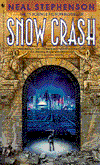 When
I was in high school I had this rule where I could only buy
hip-hop albums on cassette. The reasoning was that I only
had a cassette deck in my car, and hip-hop was best listened
to while driving. Well, I now prefer CD for hip-hop, whether
at home or in the car, but another long-standing media rule
of mine remains intact: science fiction should only be read
on small paperback, especially when you can go to your local
used bookstore (mine is called the Armadillo's Pillow, 6753
N. Sheridan, Chicago) and pick up a couple randoms for $2
apiece. On my last visit I got Snow Crash by Neal
Stephenson and Nightwings by Robert Silverberg. Stephenson
has been getting recommends from all over for several years
now. I first came across the Snow Crash book when
I was delivering pizza and Luke the Freak brought it to work
one day. He was like, "Read the first page of this book,"
and a bunch of us did, finding with amusement that it was
about a pizza delivery man of the future. I had always meant
to read the whole thing for myself one day, and it took about
six years, but I finally just finished it. The pizza thing
ends up only lasting for the first chapter (there always has
been a high employee turnover rate in the food service industry),
but there's plenty more to entice and dazzle -- this book
never lets up. It's basically a crazy hyper-future virtual-reality
hipster-nerd swashbuckling action movie on the printed page.
I can see why this guy is popular -- he has possibly the highest
Ideas Per Page score (ipp) I've ever seen in a sci-fi writer
-- very possibly averaging close to the rare 2.0 (I'd conservatively
put the whole book around 1.6 or 1.7, which is very high,
especially for a 470-page book), with some multi-page stretches
easily surpassing even the ultra-rare 3.0. His version of
a virtual reality internet called the Metaverse which users
"goggle" into is both very fanciful and very plausible,
and his version of a hyper-privatized American society marked
by hyper-inflation, hyper-advertising, and severely gated
communities with violence and wasteland everywhere else is
too. I'll give it, what, ten years? Five?? Only problem is
that in Stephenson's future there still seems to be a lot
of oil going around . . . . When
I was in high school I had this rule where I could only buy
hip-hop albums on cassette. The reasoning was that I only
had a cassette deck in my car, and hip-hop was best listened
to while driving. Well, I now prefer CD for hip-hop, whether
at home or in the car, but another long-standing media rule
of mine remains intact: science fiction should only be read
on small paperback, especially when you can go to your local
used bookstore (mine is called the Armadillo's Pillow, 6753
N. Sheridan, Chicago) and pick up a couple randoms for $2
apiece. On my last visit I got Snow Crash by Neal
Stephenson and Nightwings by Robert Silverberg. Stephenson
has been getting recommends from all over for several years
now. I first came across the Snow Crash book when
I was delivering pizza and Luke the Freak brought it to work
one day. He was like, "Read the first page of this book,"
and a bunch of us did, finding with amusement that it was
about a pizza delivery man of the future. I had always meant
to read the whole thing for myself one day, and it took about
six years, but I finally just finished it. The pizza thing
ends up only lasting for the first chapter (there always has
been a high employee turnover rate in the food service industry),
but there's plenty more to entice and dazzle -- this book
never lets up. It's basically a crazy hyper-future virtual-reality
hipster-nerd swashbuckling action movie on the printed page.
I can see why this guy is popular -- he has possibly the highest
Ideas Per Page score (ipp) I've ever seen in a sci-fi writer
-- very possibly averaging close to the rare 2.0 (I'd conservatively
put the whole book around 1.6 or 1.7, which is very high,
especially for a 470-page book), with some multi-page stretches
easily surpassing even the ultra-rare 3.0. His version of
a virtual reality internet called the Metaverse which users
"goggle" into is both very fanciful and very plausible,
and his version of a hyper-privatized American society marked
by hyper-inflation, hyper-advertising, and severely gated
communities with violence and wasteland everywhere else is
too. I'll give it, what, ten years? Five?? Only problem is
that in Stephenson's future there still seems to be a lot
of oil going around . . . .
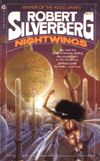 As
for the other book, Silverberg's Nightwings
. . . wow. I kinda loved it. I had no prior experience with
Silverberg, but someone I trust said I might like him so I
spent the two bucks. And damn . . . apparently Silverberg
is/was an incredibly prolific writer (easily in the 100-book
club) who had a few distinct phases. This comes from his middle
(late 60s-early 70s) dark, heavy, philosophical period and
it is a rather melancholy tale narrated by an old "Watcher"
who is travelling cross-country on foot with a "Flier"
and a "Changeling." This is one of those so-far-into-the-future-that-it-seems-like-the-ancient-past
set-ups, which is about the only kind of sci-fi I can really
feel right now, because it's a future without oil. Actually,
the book breaks the progression of mankind into three cycles
-- the first cycle, which is the dawn of man until he becomes
a fully technological animal (we're still in it, barely),
the second cycle, which is where most classic sci-fi is set,
marked by the discovery of other worlds and life forms and
astounding technological progress, and the third cycle, in
which Nightwings takes place, after the inevitable
technological collapse of society, here brought on by the
disastrous invention of giant machines to control the weather.
In fact, in this world America is almost entirely underwater,
so our characters are wandering around what used to be Europe,
to such ancient cities as "Perris," "Roum,"
and "Jorslem." A third of the way into the story,
Earth gets invaded and easily conquered by intelligent humanoid
extraterrestrials, and that's when it really gets interesting.
Silverberg's prose is simple, clean, almost biblical, with
plenty of insight and wisdom. Like this: "It was an ugly
thing to behold: human beings acting as road-agents for the
invaders. But it was inevitable that we should have begun
to drift into their civil service, since work was scarce,
especially for those who had been in the defensive guilds."
He also predicts the internet quite accurately, except that
instead of being stored on computers it's stored on the disinterred
brains of deceased humans! I also love this sort of hoo-hah:
"It was now the twelfth of the twenty hours, and time
once again for me to do the Watching. I went to the cart,
opened my cases, prepared the instruments. Some of the dial
covers were yellowed and faded; the indicator needles had
lost their luminous coating; sea stains defaced the instrument
housings, a relic of the time that pirates had assailed me
in Earth Ocean. The worn and cracked levers and nodes responded
easily to my touch as I entered the preliminaries [. . .]
I grasped handles and knobs, thrust things from my mind, prepared
myself to become an extension of my cabinet of devices."
Jeez, is this a sci-fi book or a noise tour diary? As
for the other book, Silverberg's Nightwings
. . . wow. I kinda loved it. I had no prior experience with
Silverberg, but someone I trust said I might like him so I
spent the two bucks. And damn . . . apparently Silverberg
is/was an incredibly prolific writer (easily in the 100-book
club) who had a few distinct phases. This comes from his middle
(late 60s-early 70s) dark, heavy, philosophical period and
it is a rather melancholy tale narrated by an old "Watcher"
who is travelling cross-country on foot with a "Flier"
and a "Changeling." This is one of those so-far-into-the-future-that-it-seems-like-the-ancient-past
set-ups, which is about the only kind of sci-fi I can really
feel right now, because it's a future without oil. Actually,
the book breaks the progression of mankind into three cycles
-- the first cycle, which is the dawn of man until he becomes
a fully technological animal (we're still in it, barely),
the second cycle, which is where most classic sci-fi is set,
marked by the discovery of other worlds and life forms and
astounding technological progress, and the third cycle, in
which Nightwings takes place, after the inevitable
technological collapse of society, here brought on by the
disastrous invention of giant machines to control the weather.
In fact, in this world America is almost entirely underwater,
so our characters are wandering around what used to be Europe,
to such ancient cities as "Perris," "Roum,"
and "Jorslem." A third of the way into the story,
Earth gets invaded and easily conquered by intelligent humanoid
extraterrestrials, and that's when it really gets interesting.
Silverberg's prose is simple, clean, almost biblical, with
plenty of insight and wisdom. Like this: "It was an ugly
thing to behold: human beings acting as road-agents for the
invaders. But it was inevitable that we should have begun
to drift into their civil service, since work was scarce,
especially for those who had been in the defensive guilds."
He also predicts the internet quite accurately, except that
instead of being stored on computers it's stored on the disinterred
brains of deceased humans! I also love this sort of hoo-hah:
"It was now the twelfth of the twenty hours, and time
once again for me to do the Watching. I went to the cart,
opened my cases, prepared the instruments. Some of the dial
covers were yellowed and faded; the indicator needles had
lost their luminous coating; sea stains defaced the instrument
housings, a relic of the time that pirates had assailed me
in Earth Ocean. The worn and cracked levers and nodes responded
easily to my touch as I entered the preliminaries [. . .]
I grasped handles and knobs, thrust things from my mind, prepared
myself to become an extension of my cabinet of devices."
Jeez, is this a sci-fi book or a noise tour diary?
SUICIDE:
No Compromise, by David Nobakht (SAF
PUBLISHING)
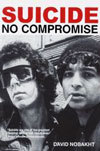 I
wasn't really ready for how, um, CRAPPY this book was going
to be. It's poorly written, poorly laid out, and I don't think
the proofreader even showed up. Nonetheless, I read the whole
thing voraciously and even as I was astounded by the sheer
crappiness, I was entertained and edified, so I still can't
really call it a failure. At least half of the book is done
"oral history" style, so the weak writing doesn't
completely dominate, and Rev and Vega have a lot of funny
and streetwise things to say. (I don't have the book anymore
so I can only quote it from memory, but there's one great
bit where Rev talks about his wild appearance back in the
early 70s, saying something like, "People used to look
at me like I was some bizarre person from the future. Which
I guess I was.") Also, it did what any music book should
do: it made me want to listen to records, namely the first
two Suicide albums, again and again -- I mean, jeezus, what
a MONSTER that first Suicide album is, and I really like the
second one too. Plus, I now really want to hear, for the first
time ever, their 1988 album A Way of Life, which
sounds pretty heavy and underrated, and was apparently recorded
in 50 minutes TOTAL. What's more, apparently Vega and Rev
have released something like 27 solo albums between them,
and every single one of 'em sounds worth a listen. I honestly
had no idea. So really, I did get a lot out of this book,
not to mention the reproduction of a "Martin Rev score"
that I swiped for the contents-page background of this issue
of Blastitude, here, look. I
wasn't really ready for how, um, CRAPPY this book was going
to be. It's poorly written, poorly laid out, and I don't think
the proofreader even showed up. Nonetheless, I read the whole
thing voraciously and even as I was astounded by the sheer
crappiness, I was entertained and edified, so I still can't
really call it a failure. At least half of the book is done
"oral history" style, so the weak writing doesn't
completely dominate, and Rev and Vega have a lot of funny
and streetwise things to say. (I don't have the book anymore
so I can only quote it from memory, but there's one great
bit where Rev talks about his wild appearance back in the
early 70s, saying something like, "People used to look
at me like I was some bizarre person from the future. Which
I guess I was.") Also, it did what any music book should
do: it made me want to listen to records, namely the first
two Suicide albums, again and again -- I mean, jeezus, what
a MONSTER that first Suicide album is, and I really like the
second one too. Plus, I now really want to hear, for the first
time ever, their 1988 album A Way of Life, which
sounds pretty heavy and underrated, and was apparently recorded
in 50 minutes TOTAL. What's more, apparently Vega and Rev
have released something like 27 solo albums between them,
and every single one of 'em sounds worth a listen. I honestly
had no idea. So really, I did get a lot out of this book,
not to mention the reproduction of a "Martin Rev score"
that I swiped for the contents-page background of this issue
of Blastitude, here, look.
ROMANTIC
LOVE UP IN THIS YOUNG PIECE (HOME UP IN THIS HOUSE PRESS)
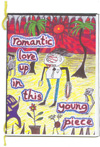 Here's
something perfect for closing this book review page out --
a little yarn-bound color-cover comic book by Britt, the guy
behind the wildly exciting Not
Not Fun record label. This comic provided me with lots
of laughs, with its constant flow of super-crude one-page
three-or-four-panel retardo-riffs, reminding me of Peter Bagge's
Stupid Comics meets the mega-absurd non-jokes of
David Rees' My New Fighting Technique Is Unstoppable collection.
Here, let me just read you a couple strips: one Pacman ghost
talking to two other Pacman ghosts who are hanging out smoking
a blunt and drinking a 40. "Hey, you guys seen Pacman?,"
he asks. "Nah, sorry dawg," they answer. "Yeh,
we just been gettin ripped. Why you lookin' for him, anyway?"
The ghost's deadpan response: "I wanna kill him cause
he's been eating all my cherries and shit." Or how about
the one where a man is talking to a bird. "Are you one
of those flightless birds?" he asks. "No, of course
not," responds the bird. "I fly like a bad-ass actually."
"Oh yeah? Then do it, I dare you!" counters the
man. In the last panel, the man watches with astonishment
as the bird appears flying a helicopter. "Check it!,"
says the bird. Alright, that's just two of the funnies, now
go enjoy the rest of the romantic love up in this young piece
for yourself! Here's
something perfect for closing this book review page out --
a little yarn-bound color-cover comic book by Britt, the guy
behind the wildly exciting Not
Not Fun record label. This comic provided me with lots
of laughs, with its constant flow of super-crude one-page
three-or-four-panel retardo-riffs, reminding me of Peter Bagge's
Stupid Comics meets the mega-absurd non-jokes of
David Rees' My New Fighting Technique Is Unstoppable collection.
Here, let me just read you a couple strips: one Pacman ghost
talking to two other Pacman ghosts who are hanging out smoking
a blunt and drinking a 40. "Hey, you guys seen Pacman?,"
he asks. "Nah, sorry dawg," they answer. "Yeh,
we just been gettin ripped. Why you lookin' for him, anyway?"
The ghost's deadpan response: "I wanna kill him cause
he's been eating all my cherries and shit." Or how about
the one where a man is talking to a bird. "Are you one
of those flightless birds?" he asks. "No, of course
not," responds the bird. "I fly like a bad-ass actually."
"Oh yeah? Then do it, I dare you!" counters the
man. In the last panel, the man watches with astonishment
as the bird appears flying a helicopter. "Check it!,"
says the bird. Alright, that's just two of the funnies, now
go enjoy the rest of the romantic love up in this young piece
for yourself!

|